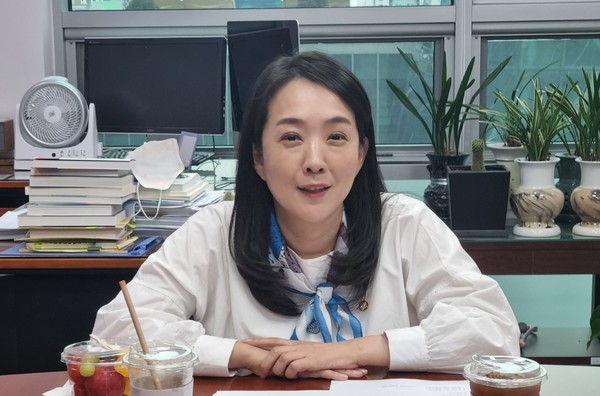As the two major political parties completed the 21st National Assembly’s second-half formation, the parliamentary discussion of an amendment to the Medical Service Act seeking to allow non-face-face-treatment will likely gain momentum.
Rep. Choi Hye-young of the main opposition Democratic Party of Korea (DPK), who sponsored the amendment bill, stressed that the bill’s passage depends on the will of the government and the governing party.

Meeting with reporters at her office in the Assembly recently, Choi said she also agrees with the medical community’s opinion that face-to-face treatment should be the rule, with non-contact care provided on a limited basis to eliminate the medical blind spots.
Asked whether the Assembly would prioritize the discussion of her amendment bill now that it has begun the second-half operation, Choi said, “No, I don’t think so under the current circumstances, although I hope it will.”
Choi said she thanked the Ministry of Health and Welfare for discussing the issue based on her amendment bill, although it was proposed by a lawmaker of what has now become an opposition party. However, she added that the process of finding social consensus would be necessary, given strong opposition from the medical community.
“As you know, non-face-to-face treatments are now permitted temporarily because of Covid-19; therefore, we are not in a hurry,” Choi said. “Most urgent is how to tide over the resurgent pandemic.”
The 44-year-old DPK lawmaker noted that the governing People Power Party (PPP) also needs to make a motion for a similar bill for the brisk discussion of the issue in the Assembly. She added that had the government regarded the non-contact treatment as urgent, the ruling PPP must have proposed a bill and pressed the opposition parties, but they have made no such efforts.
Choi stressed that her bill does not require changing all treatments to the non-face-to-face method.
“As stipulated in the bill, medical professionals should make it a rule to treat patients face-to-face,” she said. “I wrote the bill in ways to provide medical care for people in places with markedly less access, including islands, remote areas, prisons, military camps, and deep-sea fishing vessels, or those with mobility difficulties.”
Rep. Choi emphasized she fully reflected the medical community’s concerns on her bill while acknowledging she had not had sufficient consultation with them.
“I feel sorry that I could not communicate with the medical community sufficiently, but included some solutions to their concerns, such as possible concentration in some medical institutions and support for accident liability and damage compensation resulting from non-face-to-face treatment.”
Choi emphasized that her bill focuses not on the level of medical institutions but on patients.
However, she drew the line at intermediary platforms.
“Many operators of relay platforms for non-face-to-face treatment show interest in my bill,” she said. “However, I proposed the bill not to reinvigorate the industry but to improve health and medical care, although the reinvigoration of non-contact treatment might lead to the development of related industries.”
She added that if necessary, the bill could insert a provision that punishes platform operators who commit unlawful practices.

